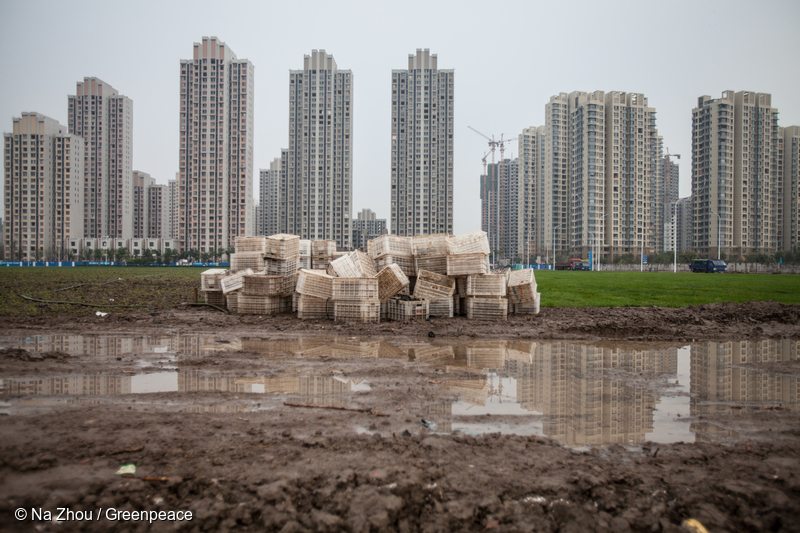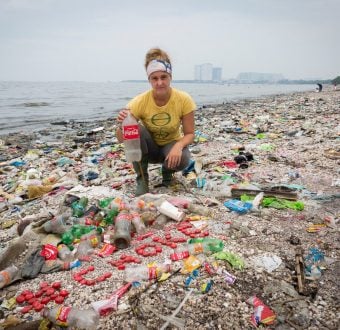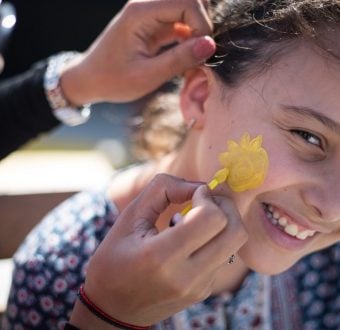This article was originally published by Greenpeace East Asia on December 24, 2015.
Just before midnight on August 12, 2015, two chemical blasts ripped through Tianjin, a major port city in northeastern China two hours away from the Beijing. The explosions were so powerful they could be seen from space, and terrifying footage of the accident circulated around the world. 203 people lost their lives that night and thousands more were left homeless, injured, shocked and afraid.
Triggered by a concoction of flammable chemicals that ignited at a warehouse run by Ruihai International Logistics, the impact was equivalent to detonating up to 20 metric tons of TNT, blasting windows out of frames and flattening rows upon rows of shipping containers.
People living in the residential compounds of Harbor City and Qihang Jia Park — both roughly 300 meters from the blast site — had no idea that they were living under the shadow of a ticking time bomb. Despite pressure from media and the public, results of the investigation into the blast still haven’t been released, and neither have full details of the safety assessment of the Ruihai International Logistics warehouse.
All across China, there are facilities just like the Ruihai warehouse, housing dangerous chemicals in residential areas. This means that right now there are more ticking time bombs located next to schools, homes and office buildings that could go off at any time.
Two months after the explosion, the people whose homes were destroyed that night are still struggling to piece their lives back together. Greenpeace East Asia spoke to five families about how the experience has changed them, and their hopes and concerns for the future.
“I thought it was the end of the world.”
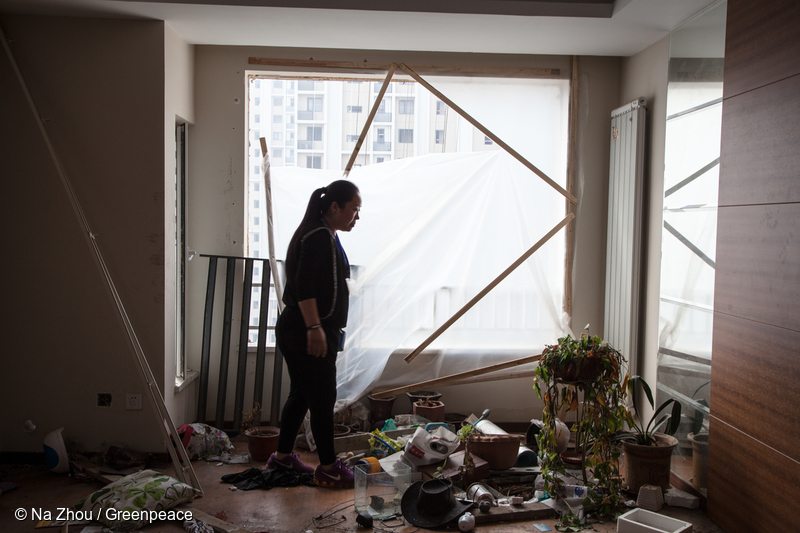
Qing Ying’s bedroom following the explosion. Qin Ying says her family was “lucky” to find a new apartment quickly after the blasts. Soon after the explosion, rental prices for apartments shot up.
Qing Ying was asleep when the blast shook her apartment, sending shards of glass from shattered windows into her thigh.
By the time the second explosion occurred, she had already grabbed her son and bolted out of the building. Due to her injuries she could barely walk, but her son forced her to keep going. As soon as she got outside, her neighbor helped her find a car among the chaos and took her to the hospital.
“For me, the most precious thing was the relationships between neighbors. It’s unusual to find such a close-knit community nowadays, but we had that.”
“I was so happy to finally have a place to call home. I never expected that after two years it would be completely destroyed.”

Chen Qiang with his daughter in their new apartment.
Chen Qiang and Fang Li moved into their new apartment in 2013, a prized possession after working hard to save and borrow money to make a purchase together.
Fang Li and the couple’s daughter were out of town on the night of the explosion, but Chen Qiang was home. Glass from the window pierced his left eye after the first explosion. By the time his wife arrived at the hospital, his eye had already been removed.
“Everyone is slowly forgetting about what happened … but we can’t.”
Chen Qiang and Fang Li are now facing a future of uncertainty. They have moved closer to the city center to make it more convenient for Fang Li to get to work, as she now shoulders more of the responsibility for providing for the family.
Even now, Chen Qiang doesn’t feel safe. “It happened once, so it could happen again.”
“If anyone had known that the container yard stored hazardous chemicals, we would have acted to change that.”
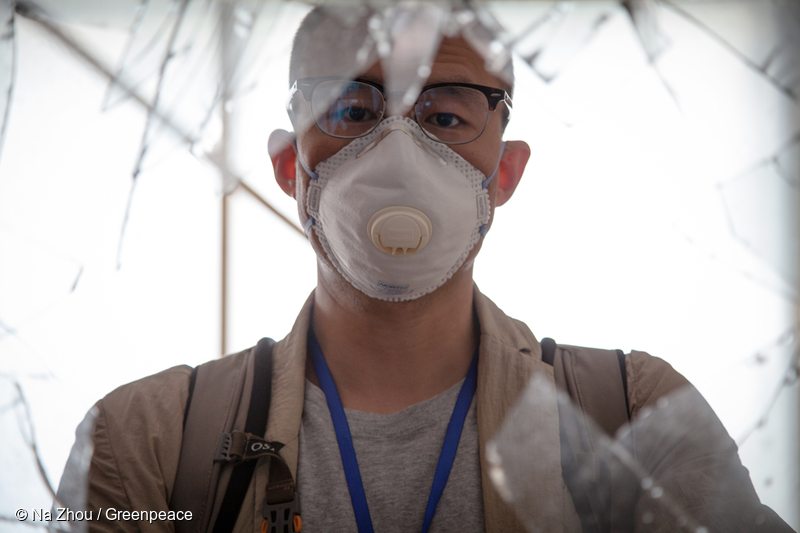
Mr. Song holds up a piece of broken glass in the apartment his father was in when the blasts struck.
Song was at a conference in the nearby Tanggu district on the night of the explosion, but his father was staying at his house. When Song heard about the explosion he rushed home to find his father, who was fortunate to come away with nothing more than a few cuts and bruises.
“I used to worry about small things. If I went away for a trip I would think, ‘who will look after my plants while I’m away?’ Now there’s nothing to take care of.”
Like any first-time home buyer, Song did thorough research before buying the apartment. When the building was under construction, he made sure to investigate the structural safety of the building.
“I checked and double checked. I thought this place was safe.”
He knew there was a storage area close to the apartment building but he had no idea it was used to store enormous quantities of dangerous chemicals.
“If anyone had known that the container yard stored hazardous chemicals, we would have acted to change that.”
“The doors and locks are gone, but it’s a symbol of trust.”
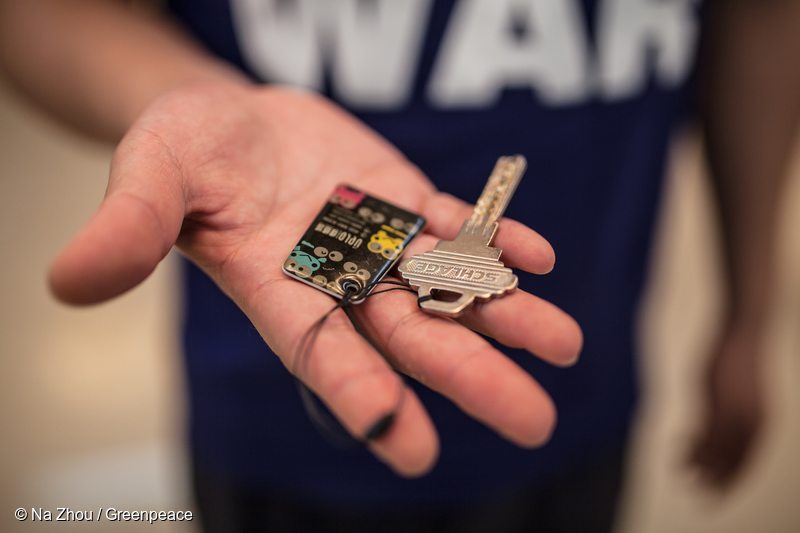
Baozi shows us his neighbor’s keys, which he kept even the doors and locks were destroyed in the blasts.
“Just when we had started a family, settled down and were ready to have a future, the explosion happened.”
Baozi’s family moved into Harbor City in April 2013. Under his roof lived three generations: his parents, him and his wife, and their child.
“It was such a lively neighborhood before the explosion. There were a lot of young families here. At night teenagers would play basketball, elderly people would dance in the square and there was a place for the kids to play.”
Now, the once bustling community is like a ghost town. Baozi showed us his neighbors’ keys that he kept as a memento of his lost neighborhood.
“The keys are useless now, because the doors and locks are gone, but it’s a symbol of trust.”
Many of his neighbors had scrimped, saved and sacrificed to build a life in this place.
“We have friends who used up their parents’ entire savings to move here. Some couldn’t afford any furniture when they first moved in. They just arrived with a mattress and slowly purchased the things they needed one by one.”
“All of a sudden, you can lose your child or your home.”
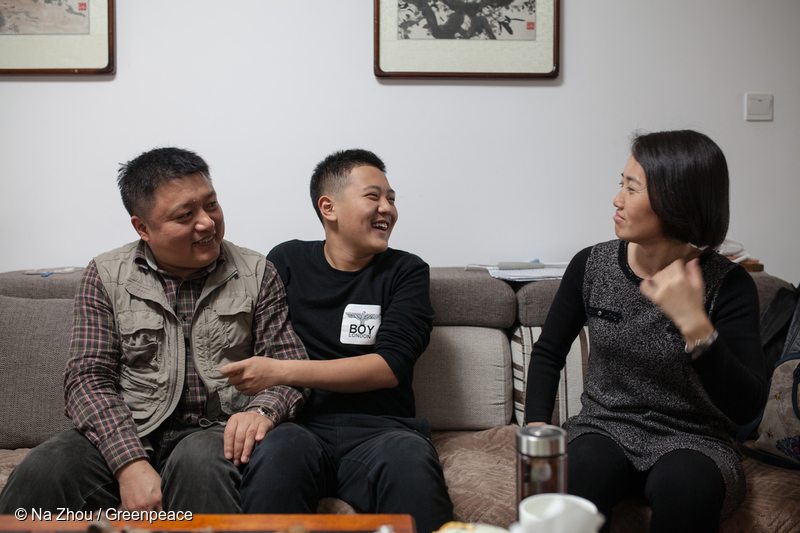
14-year-old Xiafeng, center, is covered scars on his back and shoulders from the blast that shook his family’s apartment just three months after they moved in.
The Chen family had only been living in Harbor City for three months before the explosion happened. On that night they went to bed early, but were suddenly woken by the first blast. Glass from the windows imploded, falling on 14-year-old Xiaofeng. His back and legs are now covered in scars.
As Xiaofeng ran from the building, he saw a young woman on the phone to her husband.
“We don’t have a home anymore,” she cried.
Since the explosion, Xiaofeng’s parents now think differently about life and expectations of their son.
“Being alive is the most important thing. All of a sudden you can lose your child or your home. The government can rebuild our houses, but they can’t return a life that’s lost.”
